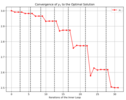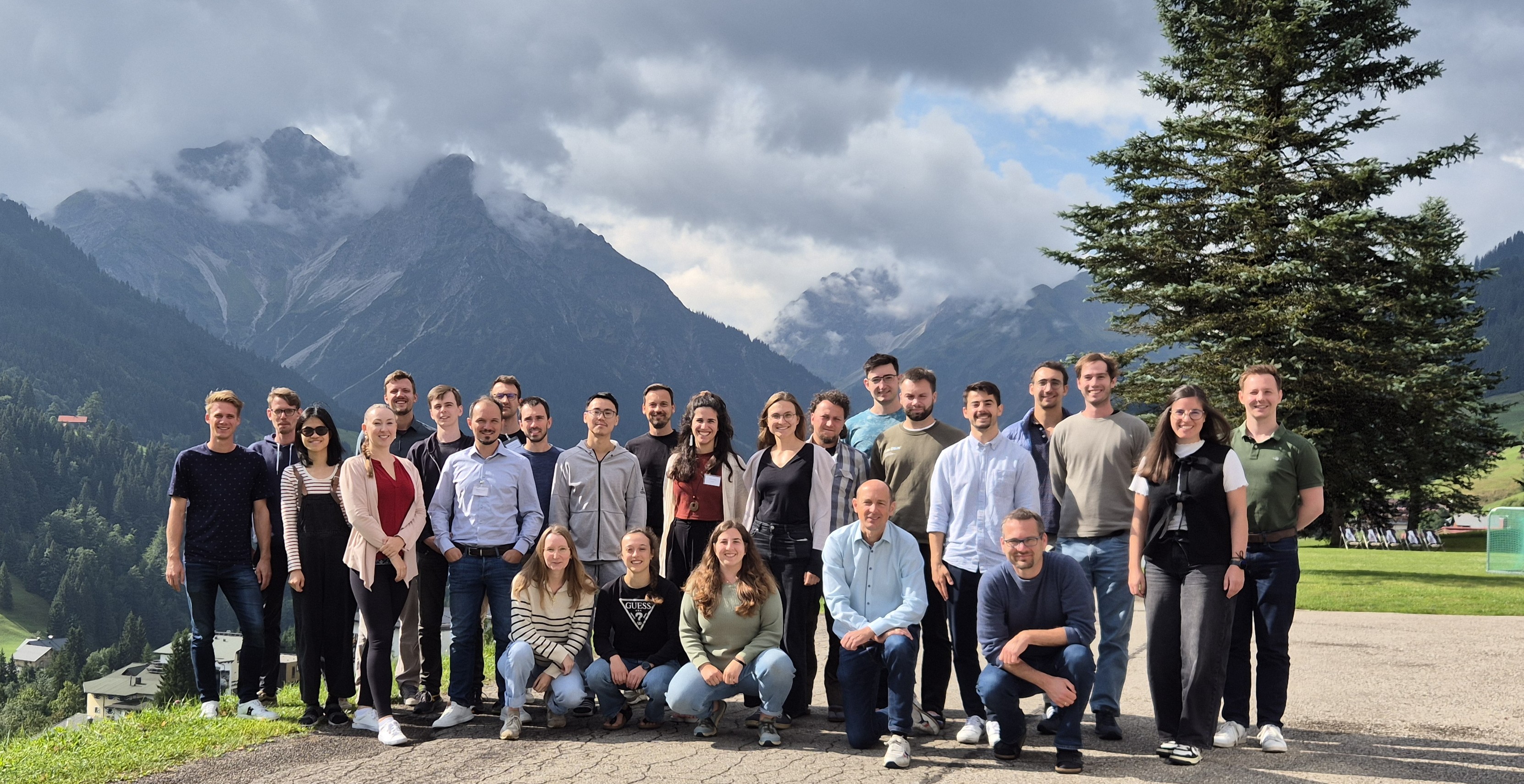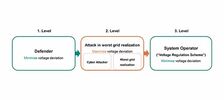M.Sc. Sina Hajikazemi

Adversarial attack on energy system models
+49 (0) 6151 16-21719
fax +49 (0) 6151 16-21715
S3|10 305
Landgraf-Georg-Str. 4
64283 Darmstadt
Research Interest
- Robust optimization
- Bilevel programming
- Parametric programming
- Sensitivity analysis
Research Project:
How much do the decision outputs of the energy system models depend on each set of input parameters?
Can big companies imperceptibly change the input parameters in order to change the decision outputs in a desired direction?
To answer the above questions, I am currently working on sensitivity analysis of the mathematical optimization based energy system models. The focus of my research is mainly on the bilevel linear programming models with millions of variables which is NP-hard in the general form.
Open theses
Supervisor: Sina Hajikazemi
Earliest start: 01.05.2025
Type: Bachelor Thesis
CESM (Compact Energy System Model[1] is a minimalistic and extensible framework used for large-scale energy system research. However, its usability is limited by the lack of a graphical user interface (GUI), making it less accessible to non-programming users. This thesis aims to design and implement a minimal GUI that simplifies key workflows such as model configuration, data input management, and result visualization.
The GUI will be developed using Python or Julia, focusing on simplicity and modularity to align with CESM’s existing design philosophy.
[1] Hajikazemi, S., & Barbosa, J. Compact Energy System Modeling Tool (CESM) (Version 0.0.9) [Computer software]. https://github.com/EINS-TUDa/CESM Prerequisites:
- Proficiency in either Python or Julia
- Familiarity with mathematical optimization techniques is beneficial but not mandatory.
Supervisor: Sina Hajikazemi
Earliest start: immediately
Type: Bachelor Thesis
Energy planning models are essential for analyzing energy and climate policies at national and global scales. However, these models face various uncertainties, categorized into uncertainties in input parameters, such as future fuel prices, and uncertainties in the structure of the model, such as the complexities and constraints inherent in different technologies. While methods such as global sensitivity analysis, stochastic programming, and Monte Carlo simulation address parameter uncertainties, they often overlook uncertainties in the model structure. In addition, policymakers are faced with considerations outside the scope of conventional modeling, such as political feasibility, regulatory challenges, and the timing of actions. As a result, policymakers may choose feasible but suboptimal solutions due to the challenges of quantifying intangibles in energy optimization models. Modeling to Generate Alternatives (MGA), a technique borrowed from the operations research literature, is a valuable approach to address structural uncertainties inherent in energy planning models as well as uncertainties in input parameters. MGA efficiently explores the feasible region around the optimal solution and generates alternative solutions with maximum diversity. By providing a spectrum of viable options beyond the conventional optimal solution, MGA provides invaluable insights for policy makers. These alternative solutions shed light on trade-offs and considerations often overlooked in conventional energy planning models, enabling policymakers to make more nuanced and informed decisions amid uncertainty and real-world constraints. This thesis focuses on implementing this approach in a German energy transition model (see github.com/EINS-TUDa/CESM) and exploring the results and insights it can provide to decision makers. Project Tasks:
- Understand the Modeling to Generate Alternatives (MGA) methodology.
- Apply the MGA methodology to the German energy transition model using the Compact Energy System Modelling Tool (CESM).
- Investigate the outcomes of the MGA implementation and identify the insights it offers for policymakers.
- Evaluate the strengths, weaknesses, and obstacles associated with the MGA methodology. Prerequisites: Proficiency in Python programming.
- Gain basic knowledge of mathematical programming techniques necessary for basic optimization tasks relevant to energy planning models.
- Develop a fundamental understanding of energy planning models, including their components, basic methodologies, and applications in energy policy analysis.
- Learn basic skills in reporting and justifying the outcomes of energy planning models, including simple interpretation of findings and basic assessment of model validity.
Supervisor: Sina Hajikazemi
Earliest start: immediately
Type: Bachelor Thesis
The increasing integration of renewable energy sources into energy systems requires the development of larger models with finer time resolutions, leading to very large optimization problems.
Scaling is an important preprocessing step that significantly affects solution speed and numerical stability.
Although solvers like Gurobi use general scaling algorithms for this purpose, they do not consider the specific structure of the model. Considering this, it is possible to develop tailored scaling algorithms for specific modeling systems. Bröchin et al. [1] formulate the problem of finding the optimal scales as a small MILP problem.
The student will review the general-purpose scaling algorithms currently used in mathematical optimization solvers. Theoretical Comparison: The student will theoretically compare these general-purpose algorithms with the approach presented in [1]. Implementation and Evaluation: The student will implement the method developed in [1] within CESM.jl [2], an educational compact energy system model developed at EINS.
Finally, the student will evaluate the effectiveness of this method compared to manual scaling performed by experts.
[1] Bröchin, Manuel, et al. "Harder, better, faster, stronger: understanding and improving the tractability of large energy system models." Energy, sustainability and society 14.1 (2024): 27.
[2] https://github.com/SinaHKazemi/CESM.jl
Supervisor: Sina Hajikazemi
Earliest start: immediately
Type: Master Thesis
One way to address uncertainty in energy system models is to explore near-optimal solutions, a process known as MGA [1]. There are multiple methods for generating these solutions. One method, the random vector method, randomly selects a new direction for the objective function[2]. This method has two advantages. First, it is parallelizable. Second, it effectively explores the near-optimal solution space.
The main disadvantage is that, since the two consecutive directions are not close enough, the method does not utilize the solver's warm start feature. Another disadvantage is that the near-optimal solution space is not normalized along all axes, so uniform sampling of directions from a unit ball does not lead to uniform exploration of the feasible space.
The student will develop methods for using warm start in optimisation solvers, for better estimation of the explored space, and for non-uniform sampling based on ranges of change along different axes.
[1] Price, James, and Ilkka Keppo. "Modelling to generate alternatives: A technique to explore uncertainty in energy-environment-economy models." Applied energy 195 (2017): 356-369.
[2] Lau, Michael, Neha Patankar, and Jesse D. Jenkins. "Measuring exploration: evaluation of modelling to generate alternatives methods in capacity expansion models." Environmental Research: Energy 1.4 (2024): 045004.
Supervisor: Sina Hajikazemi
Earliest start: immediately
Type: Master Thesis
Time-series aggregation (TSA) methods play a crucial role in reducing the computational complexity of energy system optimization models while preserving the accuracy of results [1]. Building on existing reviews and research, this thesis aims to explore novel approaches to TSA that address key challenges such as error bounding, handling extreme days, and optimizing aggregation for specific datasets like wind and solar profiles. The focus will be on developing methods that improve accuracy without significantly increasing computational burden.
[1] Teichgraeber, Holger, and Adam R. Brandt. "Time-series aggregation for the optimization of energy systems: Goals, challenges, approaches, and opportunities." Renewable and Sustainable Energy Reviews 157 (2022): 111984.
Short Bio
2010-2014: BSc Civil Engineering, Sharif university of technology, Iran
2014-2016: MSc Applied Mathematics(Operational Research), Ferdowsi university of Mashhad, Iran
since 2022: PhD student at TU Darmstadt
Publications
[Journal]
Kirill Kuroptev, Sina Hajikazemi, Florian Steinke:
Physical Defense Planning Against Voltage Distortion Attacks in Active Distribution Grids.
In: IEEE Access 13 , P. 95475-95488, 2025

[Preprint]
Sina Hajikazemi, Florian Steinke:
Solving bilevel problems with products of upper- and lower-level variables.
In: prePrint, 2025


